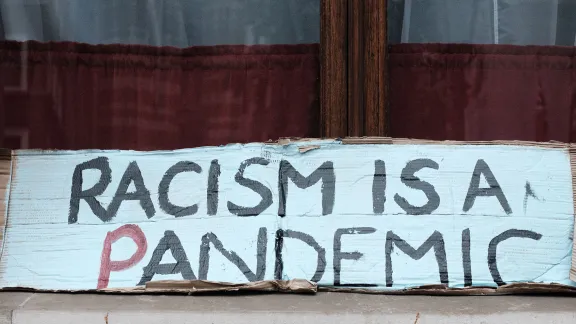
A slogan used during a recent Black Lives Matter protest in London. Photo: Ehimetalor Akhere Unuabona via Unsplash
LWF joins UN bodies and related groups pledging zero tolerance for racial discrimination in the workplace
(LWI) - The heads of major United Nations agencies and other groups working in the humanitarian sector, including the Lutheran World Federation (LWF), have issued a statement pledging to eliminate racism and all forms of racial discrimination in their workplaces.
“The LWF has the equal value and rights of each human being at the very core of its understanding as all of us being created equal in the eyes of God,”, said Maria Immonen, director of LWF World Service. “It is important to make sure that all actors in this field, including ourselves, not only identify possible racist structures or behaviors in our organizations, but act systematically to erase them.”
The LWF has the equal value and rights of each human being at the very core of its understanding as all of us being created equal in the eyes of God,
The statement, published on 10 September by the Inter-Agency Standing Committee (IASC) acknowledges that “many of our staff have been affected directly or indirectly by manifestations of racism.”
It continues: “as we work to tackle inequality and injustice in the context of humanitarian action, we must ensure that these human rights principles of equality and non-discrimination are fully realized within our own organizations.”
The Lutheran World Federation (LWF) is part of the IASC through the Steering Committee for Humanitarian Response (SCHR), a voluntary alliance of nine of the world’s leading humanitarian organizations. Immonen, who leads LWF’s humanitarian and development work, is currently serving as vice-chair of the SCHR.
Foster diversity and inclusion
“We are thankful for the awareness raising of so many within the sector and beyond regarding this problem, and together with others, we continue the struggle for a life of dignity for all,” added Immonen.
The IASC members and related groups go on to commit themselves to an eight-point plan to eliminate “systemic and institutional racism,” ensure “zero tolerance for racial discrimination in the humanitarian workforce” and foster diversity and inclusion in all their places of work.
Set up by the United Nations General Assembly in 1991, the IASC brings together the heads of 18 UN bodies and related agencies to ensure a coherent and strengthened humanitarian response to crises in different parts of the globe.


